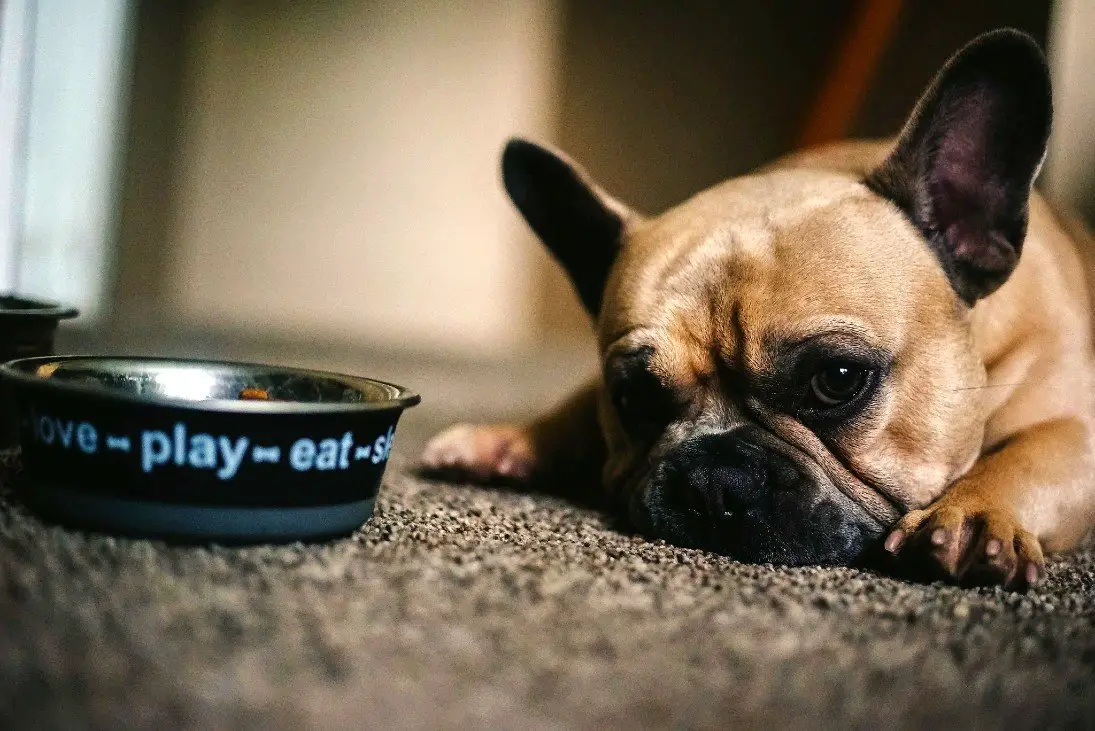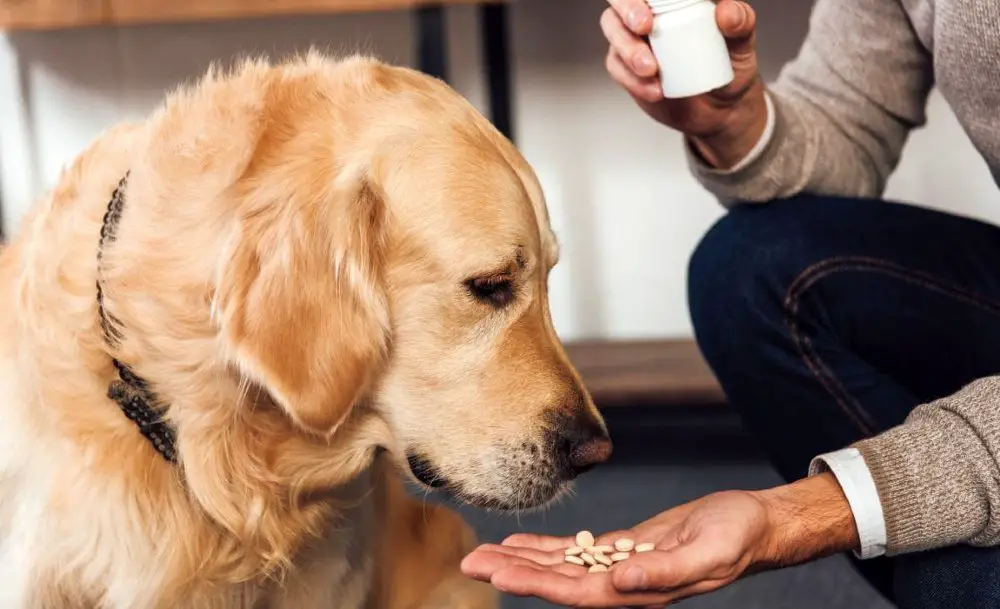How To Improve Dog Gut Health – 12 Important Ways Do It!

It appears you didn’t provide text for rephrasing.
When it comes to your dog’s health, you want the best for them and want to ensure them the best of everything. That includes dog gut health to live a long, happy life!
Let’s help improve the gut health of your dog in this article.
12 Ways to Boost Your Dog’s Gut Health
Here are tips and tricks, including those that focus on diet, exercise, and lifestyle improvements:
- Feed a Nutrient-Dense & Biologically Appropriate Diet
- Incorporate Dog Prebiotics and Probiotics
- Use Herbs instead of Dewormers
- Avoid Unnecessary Vaccines
- Add Bone Broth to Dog’s Food to Increase Nutrient Absorption
- Pay Attention to Dog Food Ingredients
- Go Grain-Free for Your Dog’s Diet
- Reduce Stress
- Try to Feed Fermented Foods
- Boost Immune System to Improve Dog Gut Health
- Treat Dog for Fleas and Worms
- Dietary Changes to Support Gut Health
It appears you didn’t provide text for rephrasing.
It appears you didn’t provide text for rephrasing.
It appears you didn’t provide text for rephrasing.
What to Use to Improve My Dog’s Gut Health?
Dog owners take responsibility for ensuring that their pets are in good health. Here’s how:
Feed a Nutrient-Dense & Biologically Appropriate Diet
You’ve heard it before: “You are what you eat.” But did you know that your dog is, too?
Your dog’s digestive system is an integral part of her overall health. It’s where nutrients from food are broken down and absorbed into the body, where waste is produced, and where good bacteria help keep harmful bacteria at bay.
So, if your dog’s gut health isn’t in tip-top shape, she may not be able to absorb the nutrients she needs to stay healthy. And if the “bad” bacteria in her gut take over? Well, it is not pretty.
But what does all this mean for YOU? First, you can help improve your dog’s gut health by making sure she eats a nutrient-dense, biologically appropriate diet—that is, one that mimics what wild dogs would eat in nature.
A diet rich in raw meaty bones (for calcium), veggies (for fiber), and fruits (for antioxidants) will give your pup plenty of good stuff to work with. Then, when the harmful bacteria try to take over, a dog will have nothing left to feed on!
It’s essential to feed your dog a nutrient-dense diet because it will give him more nutrients than he would get from commercial food or even homemade meals. If you’re supplementing with raw food or adding probiotics, make sure it’s high in protein and vitamins!

Incorporate Dog Prebiotics and Probiotics
A healthy gut is essential for a healthy immune system and a healthy dog. In addition, dogs not on the proper diet can experience many health issues, such as allergies, digestive problems, and chronic skin conditions.
Some dogs have a sensitive gut, and they need to be careful about what they eat. When it comes to gut health, a dog’s diet needs to be supplemented with prebiotics and probiotics to grow good bacteria in their gut.
The best way to keep your dog’s gut happy is by adding prebiotics and probiotics to his diet. Prebiotics are non-digestible food ingredients that help improve the gut’s microbiome by feeding the good bacteria in your dog’s stomach.
Meanwhile, probiotics are live bacteria found in supplements or yogurt, which have been shown to help improve digestion in humans and dogs alike.
Use Herbs Instead of Dewormers
It is a well-known fact that they can strengthen dogs’ immunity by adding herbs to their diet. The best way to do this is by adding them to the dog’s food.
Herbs are known for combating harmful bacteria in the gut, leading to diarrhea, vomiting, and other gastrointestinal problems. It also helps improve a dog’s gut health by adding beneficial bacteria that can help fight against harmful bacteria in the gut.
The use of herbs as a natural alternative for dewormers has been proven successful in improving a dog’s gut. In addition, they contain many nutrients and vitamins not found in commercial dog foods.
Herbs such as peppermint, garlic, and ginger have been shown to impact the gut microbiome in dogs positively.
Peppermint has been shown to reduce inflammation in the digestive tract, associated with irritable bowel syndrome and inflammatory bowel disease in dogs. In addition, garlic has been shown to help prevent diarrhea.
Ginger can help alleviate stomach aches and gas pains that may be caused by gastrointestinal problems like inflammatory bowel disease or irritable bowel syndrome.
Avoid Unnecessary Vaccines
Dogs have a sensitive gut, and they are also vulnerable to many diseases. Therefore, it is essential to keep their gut health to improve their immune system and avoid unnecessary vaccines.
A dog’s immune structure is primarily influenced by their food, which can be good or bad for them. And when it comes to food, there is no such thing as a one-size-fits-all approach.
They should tailor their diet according to the dog’s individual needs because not all dogs are created equally. For example, if a dog has a sensitive stomach, it might need more fiber or different types of fat than another dog that doesn’t have sensitivities.
Remember, several unnecessary vaccines are routinely given to dogs, which can harm their gut health. In addition, puppies are routinely vaccinated against diseases that they are not likely to catch, which can damage the delicate balance of bacteria in their gut.
The overuse of antibiotics is a contributing factor to gut problems in dogs. Antibiotics kill harmful bacteria and the beneficial bacteria that are essential for a dog’s gut health. Also, overuse of antibiotics can lead to the development of antibiotic-resistant bacteria.
Add Bone Broth to Dog’s Food to Increase Nutrient Absorption
Bone broth is a hot trend in the human health world, and for a good reason: it’s nutrient-dense and helps improve gut health. However, many people don’t know that bone broth is also an excellent way to enhance the gut in dogs.
The broth contains collagen, which is beneficial for dogs because it helps improve gut health and nutrient absorption. It also helps keep their intestines healthy and functioning correctly.
Additionally, bone broth is high in protein and essential minerals like magnesium, potassium, and calcium.
So, if you’re looking to improve your dog’s gut health, consider adding bone broth to his food. You can either make it yourself or buy it pre-cooked or prepared.

Pay Attention to Dog Food Ingredients
The food that we give our dogs directly impacts their gut health. The better the gut, the less likely they will suffer from health problems like obesity, allergies, and skin issues.
Recent studies have shown that the ingredients in dog food can have a significant impact on dogs’ guts. Some of the most common ingredients in dog food can lead to an imbalance in the gut flora and cause serious health problems.
There are a few ingredients that you should look for when choosing dog food to improve your dog’s gut health. The most important one is probiotics. Probiotics are beneficial bacteria that keep the gut healthy. They can be found in both dog food and supplements. Prebiotics are also important, as they provide food for the probiotics.
Some of the worst offenders include corn, soy, and wheat. These ingredients cause inflammation and upset the delicate balance of bacteria in the gut.
Go Grain-Free for Your Dog’s Diet
If you’re looking for a way to improve your dog’s gut health, you may want to consider going grain-free. Grains are a common food allergen for dogs and lead to digestive problems. A grain-free diet can help resolve these issues and can also be beneficial for dogs prone to weight gain or skin allergies.
Grain-free diets are becoming more popular for dogs, and there’s a good reason for it. Grains are known to cause inflammation in the gut, leading to a variety of health problems. Grain-free diets are a great way to improve your dog’s stomach and overall well-being.
You should keep in mind a few things when switching your dog to a grain-free diet.
- First, make sure that the diet is high in quality protein. Dogs need protein to build muscle and repair tissue.
- Second, be sure to add plenty of healthy fats.
- Third, avoid giving your dog processed foods, as they often contain unhealthy additives and chemicals.
- Fourth, feed your dog a balanced diet that includes plenty of probiotics.
Reduce Stress
It’s no secret that dogs are susceptible to stress. Like humans, dogs’ gut health can be seriously impacted by stress. And, just like humans, dogs who have healthy guts are less likely to suffer from a range of health problems.
There are many ways to reduce your dog’s stress. One of the most important is to create a calm environment for them. Make sure they have a comfortable place to sleep, a safe space to retreat when they feel overwhelmed, and plenty of toys and activities to keep them occupied.
Stress can cause your pet’s digestive system to inflate, leading to diarrhea, vomiting, and other gastrointestinal problems. If you notice that your dog has been experiencing these symptoms, try to reduce their stress level. It may mean taking them out for some exercise, playing fetch, or giving them something to chew on. You could even bring them into the house and let him lay down in a quiet room.
Try to Feed Fermented Foods
Fermentation is an action that the human body can do to produce vitamins and other nutrients. Sometimes, it is not enough to feed fermented foods to the dog.
Some have not worked for dogs. So how do you know if a dog is doing well on this diet?
You would have to be careful and have good observation skills. If you see changes in weight, blood sugar, or blood chemistry, you would be able to tell if the difference was from a diet. Get a vet’s opinion on this issue. Many vets recommend a keto diet for your dog if it’s showing signs of sickness or if the owner is having health issues.
Also, if your pet is on any type of food that is high in sugar or has sugar in it, try to stick to a low-sugar diet to prevent the potential for obesity. Even a 5% change in your diet can help your health and your dog’s health!
Boost Immune System to Improve Dog Gut Health
Your dog’s gut is the hub of his immune system. It has gut-associated lymphoid tissue, a defense mechanism that protects the system and helps with food digestion. So, if the gut is not healthy, the whole body isn’t healthy.
The gut is an amazing organ that is as complex as the brain. Therefore, the potential health benefits from optimizing gut health are staggering.
The gut is one of the most potent immune system organs, like the liver and kidneys.
Since the gut is a major player in overall health, natural treatments that target the gut often have far-reaching benefits for a dog’s health.
The gut contains the most significant number of immune cells in the body, known as the gut-associated lymphoid tissue (GALT). The health of your dog’s GALT is essential for a healthy resistant structure.
Treat Dog for Fleas and Worms
Dogs often have problems with their gut health, and various factors can contribute to or cause these issues.
Dog worms are associated with a dog’s sensitive tummy. Treating worms often has a positive effect on a dog’s gut.
It is because you remove a parasite that your dog’s gut needs to fight off. So it’s good to get your dog on a good worm and flea treatment.
Treat your dog for fleas and worms to help prevent infestations and ward off illnesses that may affect his digestive system. By controlling pests, you’ll decrease any discomfort your dog might feel—and improve his digestive health.

Dietary Changes to Support Gut Health
High Protein Diet
Dogs are carnivores, which means their bodies are designed to digest and extract nutrients from a high-protein diet. It’s essential to feed them with high-quality ingredients to give their body all it needs for optimum mental health.
Low Carbohydrates
The best diet for dogs is low in carbohydrates and high in meaty proteins like chicken, lamb, duck, and fish. Many commercial dog foods contain corn and other grains. These foods are inexpensive fillers but don’t offer much nutritional value.
Natural Ingredients
Instead of choosing these types of food, look for brands that use more natural ingredients, such as fresh meats and vegetables. You can add new foods to your dog’s diet by making homemade meals using organic meats, eggs, or vegetables.
Fresh Foods
Fresh foods provide an easy way to ensure you’re giving your pet all the vitamins and minerals he needs for a healthy digestive system. Just be sure to cook all foods thoroughly before serving them to your pet. If you have any questions about what’s safe for your dog, talk with his veterinarian about any potential risks or allergic reactions.
Supplements
The vet may recommend supplements if your pet struggles with chronic diarrhea or vomiting. In some cases, a short course of antibiotics may be necessary to clear up bacterial infections in your pet’s digestive tract.
However, never administer antibiotics without consulting your vet first—some breeds of dogs, including pugs and English bulldogs, are more susceptible to developing side effects when taking medications. Always check with your vet before administering any kind of drug or supplement to your pet.
Any questions for now?
FAQs for Dog Gut Health
Here are some of the frequently asked questions when it comes to your pet’s healthy gut:
What Are Beneficial Bacteria, and Why Do Dogs Need Them?
Beneficial bacteria, or probiotics, are microscopic organisms that live in a dog’s gastrointestinal tract. They help regulate digestive processes and fight harmful bacteria in your dog’s gut. So what causes terrible gut health in dogs, and how do I know if my dog has it? Many factors can affect dog health; these include age, illness, physical activity levels, eating habits, and stress levels.
What to Give Your Dog for Gut Issues?
To clean up your dog’s gut, eliminate all processed foods and grains.
- Give your dog only real meat and raw vegetables.
- Water is a good choice for drinking.
- Add some digestive enzymes to aid in digestion.
- Keep your dog at a healthy weight—overweight dogs are more likely to suffer from digestive issues.
- Avoid giving your dog sugar and dairy products as they can cause or exacerbate GI problems.
- Probiotics can help improve the dog’s gut by replenishing helpful bacteria they may have depleted during antibiotic use or stress.
How to Reset a Dog’s Digestive System?
To reset a canine’s digestive system, introduce beneficial bacteria through pet probiotics. Probiotics help improve your dog’s gut health by creating an environment where bacteria flourish, and harmful bacteria cannot survive. As dogs are naturally carnivores, they are also more likely to enjoy raw food or a vegan diet, which allows their digestive systems to function optimally.
Be sure to avoid feeding them corn-based foods and drinks (such as soda), as these can harm dogs’ digestive systems.
What Are the Causes of a Dog’s Poor Gut Health?
There are three leading causes of a dog’s poor gut or digestive health.
- The first one is the overuse of antibiotics or an unhealthy diet.
- The second cause of a dog’s poor stomach can be attributed to not feeding your pet enough fiber.
- The third cause of a dog’s poor gut is terrible bacteria getting into their bodies.
You’re now up for your dog’s healthy stomach.
Conclusion
As we’ve learned, dogs are naturally omnivores and can eat various foods. But their digestive system is different from ours, so their food should be tailored to them. Don’t just feed your dog anything a dog wants; adjust their diet, which includes plenty of fiber and protein and has little salt, sugar, and saturated fats.
Check-in with your vet regularly to ensure your dog’s gut health is improving. The tips in this article would be helpful to ensure your pet’s health is in great shape. Did we help you out? Leave us a comment then.

Great Post except for pushing the tick and flea meds.,They have damaged my 2 pups severely